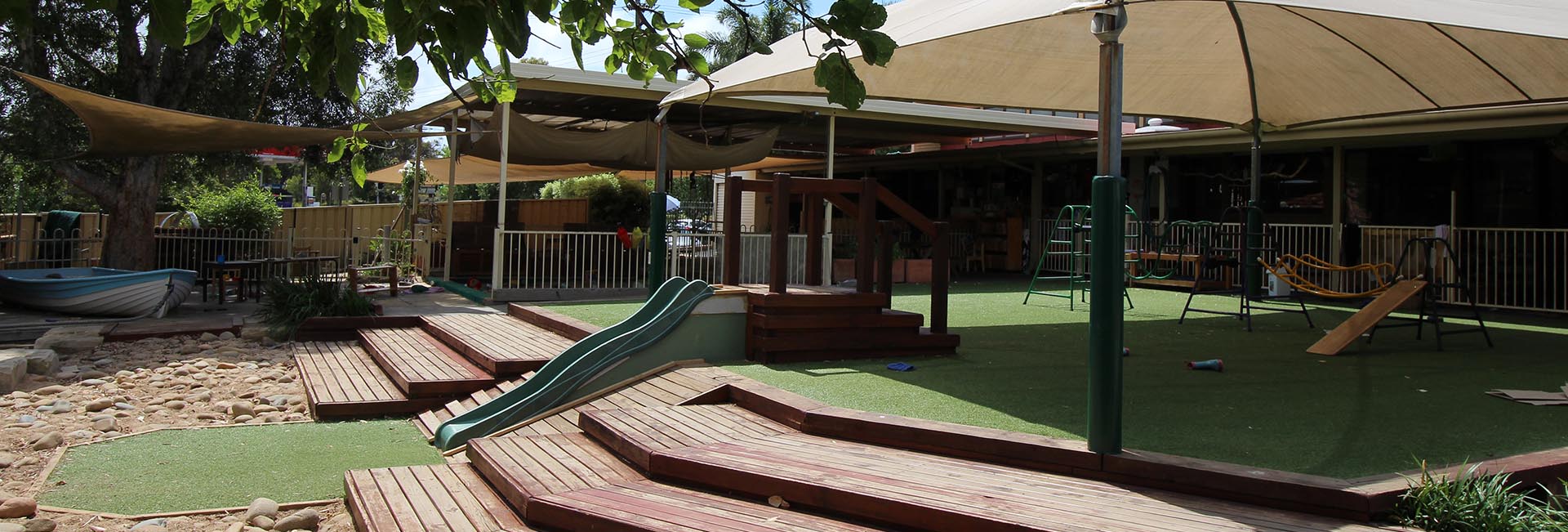We aim to create an environment for children that is warm and nurturing. We want to make children feel like they belong. We want users of the environment to respect each other, and take pride in the opportunities that arise in such a relaxed environment.
At Warners Bay Early Learning and Care Centre we pride ourselves on our natural elements of the outdoor learning environment. Our large playground is shared by the 2-5 year old Pre-school children and we have a smaller playground for our Nursery Room that ensures all children feel safe, secure and confident to explore. Our yard is surrounded by established trees, shrubs, garden beds, rocks, grass areas, edible gardens, digging patches, climbing tree and sandpits that offer opportunities for open-ended imaginative play and a variety of sensory experiences. These opportunities allow children to strengthen their sense of agency and gain understandings about the natural world.
Environmental responsibility is promoted in the outdoors not only through the focus on natural elements and using natural objects wherever possible, but also on how Educators re-think, re-use and purchase equipment made from recycled materials. The worm farm and vegetable garden beds are used to intentionally teach sustainable practices with the children.
At Warners Bay Early Learning and Care Centre we believe in Risky play. The more children are free to engage in risky play the better they will be at managing risks, judging what they are capable of, and keeping themselves safe. Risky play is an invaluable part of childhood. Research shows that not only does it increase children’s physical and motor skills but also teaches them about their own limits, and how to deal with risks in the future. We feel it is important that as educators we provide children with an environment where they can engage in risky play that is as safe as necessary rather than as safe as possible.
We also understand that it is important for us as educators to raise awareness about risky play to our parents and families. We believe communication between our educators and parents is the key to promoting the benefits of risk taking. We want to promote to families on how their children are learning and developing through the experiences and opportunities they are involved in.
This will reassure parents that their children are developing and learning in an environment that is exciting and challenging for their children, but where unnecessary risk is managed. As educators at WBELCC we are passionate about risky play and manage the risk within the setting to help ease any parental anxiety. We give children real life opportunities including fire safety.
The natural environment affords children many opportunities to develop knowledge and skills which will help them cultivate and sustain their emerging autonomy, resilience, and a capacity to assess and manage risk during play. In essence, the skills required to manage risk constitute critical life skills which should be thoughtfully considered when educators program for children. As parents and educators, it is important that we provide children with appropriate opportunities to identify and respond to their innate ‘fight-or-flight’ response; that uncomfortable ‘gut’ feeling that represents our own natural warning system. Research dictates we actually do children a grave disservice when we attempt to eliminate all risk from their lives. A fire gathering has the potential to enhance a sense of belonging and partnership within a community. Fire symbolizes important aspects of our history and culture, and by providing children with fire experiences we are continuing this long tradition. Experiences with fire will enable links to learning in relation to Australia’s Indigenous history and contemporary Indigenous spiritual practices. For many children, lighting a fire and cooking in the outdoors will be an exciting new and rewarding experience. Bushfires are a relatively common occurrence within the Australia landscape and fire safety awareness is a valid addition to our educational program provided for your children.. Fire is unique—there is nothing like it for the noise it makes or how it looks or the obvious power it has—and that fascinates children who want to experience it” (Armitage 2011 p14).




